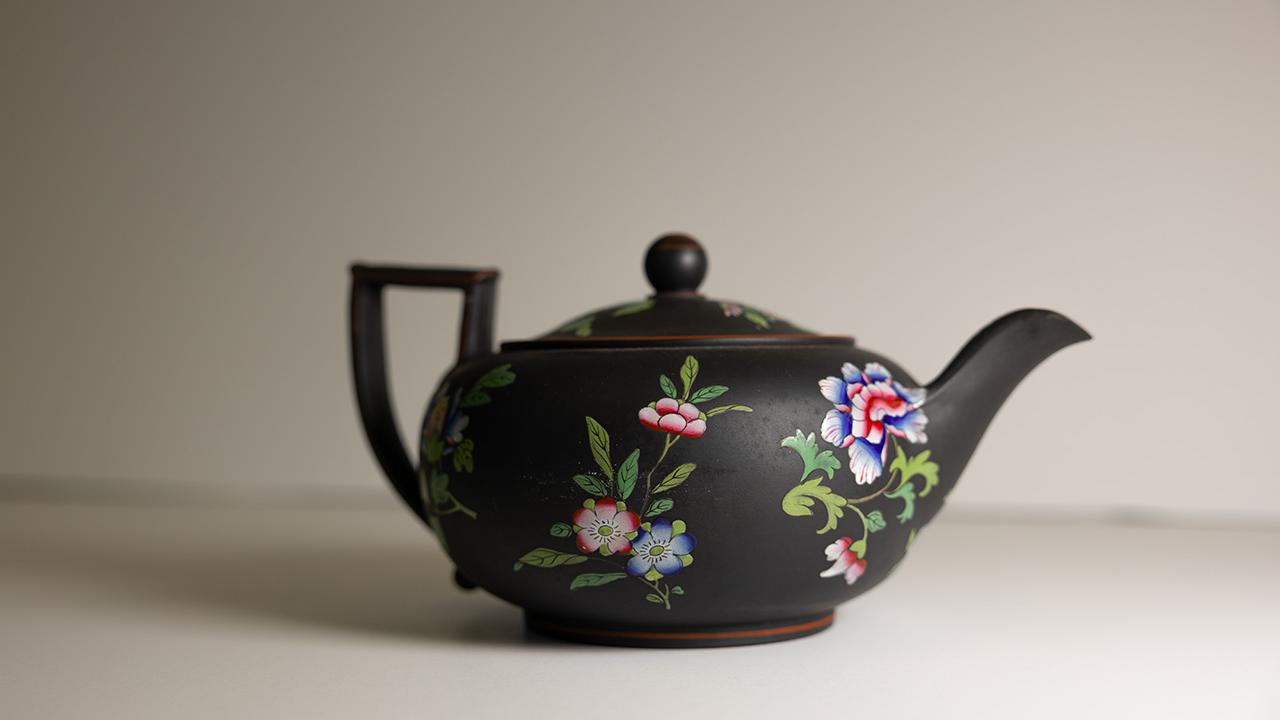
GTI Celebrates its 10th Anniversary with Upcoming Colloquium
The Global Tea Institute celebrates its 10-year anniversary this year. In the last decade, what started as a group of 12 like-minded scholars gathering together has turned into a hub for the study of tea across the disciplines. Every year its annual colloquium brings between 400 and 800 people from all over the world to UC Davis.
“People are interested in tea,” said Katharine Burnett, director of the Global Tea Institute (GTI) and co-chair of the Department of Art and Art History in the College of Letters and Science. From its medicinal properties, calming effects and warmth to its historical and cultural significance, there are seemingly endless ways to study tea.
Burnett wants that research to happen here at UC Davis. With GTI and its affiliated events and programs, she hopes to inspire more tea scholarship.
A curiosity about teapots
Burnett’s tea journey didn’t actually start with tea but teapots — specifically her niche curiosity about the sudden reduction in size of Yixing-ware teapots during the late Ming Era. Her studies on cultural values led Burnett to research the relationship between this downsizing and period discourse about originality in 17th-century China.

Burnett’s research has since extended to investigating the relationship between China and its Southeast Asian neighbors between 1300–1700, when brewed tea became the norm. The border-crossing project is leading to many new insights about the history of tea and how culture is formed. But tea research at UC Davis isn’t limited to East Asia, or even history.
Students affiliated with GTI are from across disciplines and colleges. One Ph.D. student is researching the art of tea from an anthropological standpoint, an MFA student designed ecological tea houses, while yet another student is leading a study on tea breeding and the human microbiome.
This range in scholarship will be on display at this year’s colloquium on Thursday, January 30.
From idea to institute
It was 2012 when, at a lunch meeting, food and wine expert Darrell Corti posed the question to Burnett: “Why doesn’t UC Davis study tea?”
Burnett, who happened to bring some teapots and teapot-shaped objects with her that day, responded: “UC Davis should study tea!”
A research cluster made up of faculty and librarians quickly formed.
At the time, Burnett was newly appointed as director of the Program for East Asian Studies. She wanted to elevate awareness of the program and envisioned UC Davis as a global hub for tea research that could someday even be equipped with a tea room accessible to students on campus. But funding was difficult to come by, at first.
“I think we were way ahead of our time and people just didn't understand the value in studying tea,” Burnett said. “There were individuals studying it on campus and off, but they were so under the radar. And, largely in the U.S., nobody cared.”
The team had to convince university leaders that tea was something to get excited about. Burnett would soon speak in China at the Xiamen International Tea Industry Fair, where industry professionals and scholars alike expressed enthusiasm for the idea of UC Davis being a hub for tea research. Burnett took that enthusiasm — and promises of funding — back to leaders in Davis, finally securing a three-year seed grant with the support of the Provost, the College of Letters and Science, and College of Agricultural and Environmental Sciences.
By 2015, the original research cluster of 12 grew to become The Global Tea Initiative for the Study of Tea Culture and Science. An unexpected number of people from all over the world attended its first annual colloquium.
“We were thinking that we would get 40 people — 50 or 75 maybe,” Burnett said. “Well, the first time, 400 people showed up and the numbers have been consistently between 400 and 800 every year since.”
In 2023, with the promise of a $2 million endowment, there was an official name change, taking GTI from an initiative to an institute: The Global Tea Institute for the Study of Tea Culture and Science.
Now brewing at Global Tea
From an upcoming book series dedicated to tea research to new course development and programs, there’s no shortage of energy at GTI.

The book series, Global Tea Studies, published by De Gruyter Brill, will mimic the structure of GTI. It will be “open to studies about tea from any place in the world, at any time, and in any method as long as the topic is tea.” With Burnett as editor-in-chief, the series aligns with a growing interest in tea across disciplines, just as the Global Tea Institute (GTI) at UC Davis also supports and encourages such interdisciplinary research and thinking.
“Just like GTI is the world's first and only comprehensive institute to study tea, this book series is the world's first and only book series dedicated to tea,” Burnett said.
At the same time, GTI affiliated faculty are developing courses that will lead to a Global Tea Studies program, a minor and, eventually, a major. Working with the tea industry and UC Davis Continuing and Professional Education, GTI began a certificate program for industry professionals last year.
According to Burnett, while the undergraduate program being developed by GTI is comparable in some ways to viticulture or the coffee center — “Like the coffee center, how do you brew a good cup of tea?” — it is also very different in how all-encompassing it is. Its collaborations are university wide from agriculture and nutrition to art, history and culture, to design and chemistry, and so on.
“There's simply nothing like this in the world,” Burnett said.
Though there are institutions that research tea, especially in famous tea production areas such as Japan, China and India, that work is mostly concentrated on agriculture and breeding and isn’t across multiple areas.
“With UC Davis' strengths in agriculture and nutrition — number one in these areas in the world typically — but also with UC Davis' prestigious faculty in departments and programs across the different colleges, and with over 100 undergraduate majors and graduate programs, we can bring research expertise on tea from almost any discipline any approach anytime any space,” she added.
Bringing communities together
This year’s colloquium theme is “Tea and Peace: Bringing Communities Together.” Discussions will cover topics such as medicinal tea uses for both mental health ailments as well as cognitive function in addition to cultural and historical topics in tea, including its use in 17th-century Kyoto and its use and rebranding during World War II.
“What I love about this format is that there's something for everybody and even if, say, you're not a science person, you're going to really get something out of the science presentation,” Burnett said. “I think these colloquia have that effect of ‘whoa’ — your knowledge expands. You have all these questions and then the side conversations that you can have with other members of the of the audience ... you never know who is going to happen to be sitting next to you.”
The colloquium, she said, has this kaleidoscopic effect on attendees, building knowledge and curiosity throughout the day as different speakers bring about new connections and questions.
“It's a pretty amazing opportunity for people to network and get to know different people in the industry if you're a tea expert or you just like tea. There's something for every level and it's really wonderful.” — Burnett
Scholarly speakers include Klaus Lange, professor of food, nutrition, lifestyle and health at University of Regensburg in Germany, also an affiliate professor at the Nara Institute of Science and Technology in Japan; Dr. Juan Fernando Ortiz, neurology resident at Corewell Health West at Michigan State University; Morgan Pitelka, professor of history and Asian Studies at University of North Carolina – Chapel Hill; and Erika Rappaport, professor of history at UC Santa Barbara.
The industry panel will be chaired by "Tejava Tea Expert" Mohammed Hussain, vice president of operations and product development for Crystal Geyser Water Company. The industry panel will include Nishchal Banskota, found of Nepal Tea Collective; Fajar Yusuf, Consul for Economic, Trade, Health and Tourism Affairs at the Consulate General of the Republic of Indonesia in San Francisco.
Reading the tea leaves
The Global Tea Institute has come a long way in building its reputation as a hub for tea research and a home for tea scholars to share their ideas. But GTI has big dreams.
What GTI needs to make its plans for growth a reality is endowed funds for a dedicated building, director position and faculty chairs across the university's four colleges and six professional schools, according to Burnett.
In addition to being able to offer more courses and programs to students, Burnett hopes GTI will someday have its own building with a dedicated sensory theater, tea processing center, conference and seminar rooms, meditation/study hall, a public tea room and exhibition hall for narrating stories of global tea featuring the GTI Collection of Art and Material Culture. She said it would, ideally, be nestled along the Arboretum near the Gorman Museum, where the institute’s collection of art and cultural materials can be exhibited, tea ceremonies can be held, students can meditate and the public can enjoy Chinese and Japanese-style stroll gardens.
Such a location could also provide an opportunity for students and the community to try different types of tea and experience teas from different regions of the world, building cultural understanding and sharing notions of what tea is, as well as providing a calm place for students to relax or study.
“Having hammocks on the main quad of campus was a brilliant stroke of genius but we also need a tea center that allows people to come in, turn off their cell phones and just sit with a cup of tea,” Burnett said. “Tea soothes and brings people together.”
YOU MAY ALSO LIKE THESE STORIES

Reimagining the Past Through Food Justice
With flavor and flair, a community of academics, chefs and food justice advocates are sparking conversation at UC Davis and beyond through the new seminar Thinking Food at the Intersections: Justice and Critical Food Studies. The seminar series is supported by a $225,000 grant from the Andrew W. Mellon Foundation received earlier this year.

Globalizing the Middle and Early Modern Ages
Scholars in the Medieval and Early Modern Studies program are working to dispel the caricatures of this era by de-centering European history from the discourse and showing how, in fact, much of the world was experiencing acculturalization, or borrowing, adapting and mixing traits from various cultures.
